Too Much Screen Time? Camp Can Help!
By Audrey “Sunshine” Monke, originally published at Sunshine Parenting.
I’ve learned to face my fears, I’ve tried new things, and I have learned that you don’t always need to have your phone or video games.
-Kimberly, Camper
Children between eight and ten years old currently spend nearly eight hours a day on media. Adolescents average nearly eleven hours per day, seven days a week, on screens. The negative impact of this digital lifestyle is evident in kids’ expanding waistlines as well as their growing lack of interest in being outdoors. Now there’s an additional worry about the impact of our kids’ excessive screen use: anxiety.
In a New York Times article—Why Are More American Teenagers Than Ever Suffering From Severe Anxiety?—Benoit Denizet-Lewis writes, “Anxious kids certainly existed before Instagram, but many of the parents I spoke to worried that their kids’ digital habits—round-the-clock responding to texts, posting to social media, obsessively following the filtered exploits of peers—were partly to blame for their children’s struggles. To my surprise, anxious teenagers tended to agree.”
Anxiety is on the rise—among children, teens, and adults—and our screen time is exacerbating the issue. The problem is not just with teens. Adults are modeling this uber-connected life and experiencing a similar rise in anxiety. Ubiquitous screens are all that this anxious generation has ever experienced, and as parents, we can feel powerless to stop devices from overtaking our family’s lives.
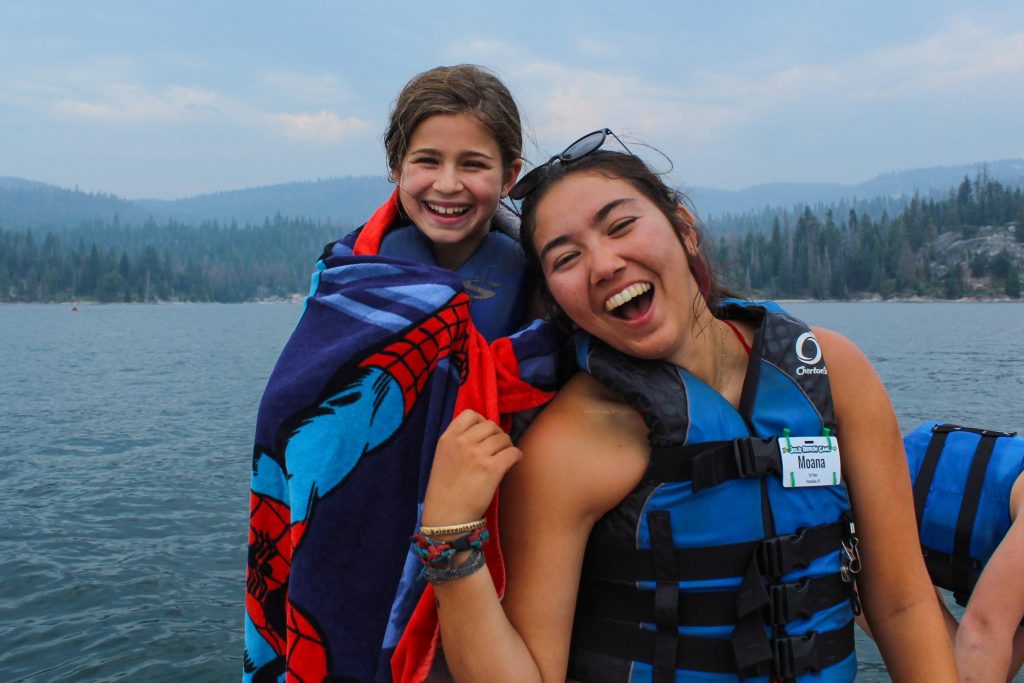
Whether sending or receiving SnapChat messages, watching YouTube videos, scrolling on Instagram, playing video games, or taking 100 selfies to find the best angle, our children are inundated with digital input while also feeling pressure to post the “right” things. The attraction of media is hard to resist, so most of us (including parents) simply succumb to having the near-constant presence of our electronics.
Many of us find it difficult to drag ourselves away from our laptops and smartphones, and often our schedules and lifestyles don’t allow for adequate time to just be outside and enjoy our natural surroundings. Richard Louv coined the term “Nature Deficit Disorder” in his book Last Child in the Woods to describe the alarming trend of children spending less and less time outdoors. Whether due to sensational media accounts of lost hikers that have fanned parental fears, or simply a lack of time in over-scheduled lives, children simply aren’t outside playing as much as they used to. Instead, they’re inside on their screens.
I don’t think anyone would debate that we all need to unplug more, but it’s very difficult to actually get kids off their screens, especially now that many schools are operating virtually, and most kids have their own smartphone by middle school.
Recently, I interviewed a mom who gave clear instructions before her twelve-year-old daughter’s birthday slumber party: devices would NOT be allowed. But this mom, unfortunately, is still the exception, not the rule. She lamented that when her kids go to other people’s houses, they complain that all the kids do is play on their devices the entire time. While we can get our kids to turn off and put away screens at home, it’s difficult to monitor them when they’re not at home. And, unfortunately, kids are drawn to homes where screens are not as limited.
While a few weeks at camp is not the only answer to all the screen and anxiety problems, camp experiences can be a great salve for our kids. Breathing fresh air, connecting face-to-face, and not worrying about “likes” and what they’re missing, kids relax and enjoy themselves. And they report feeling happier and less anxious.
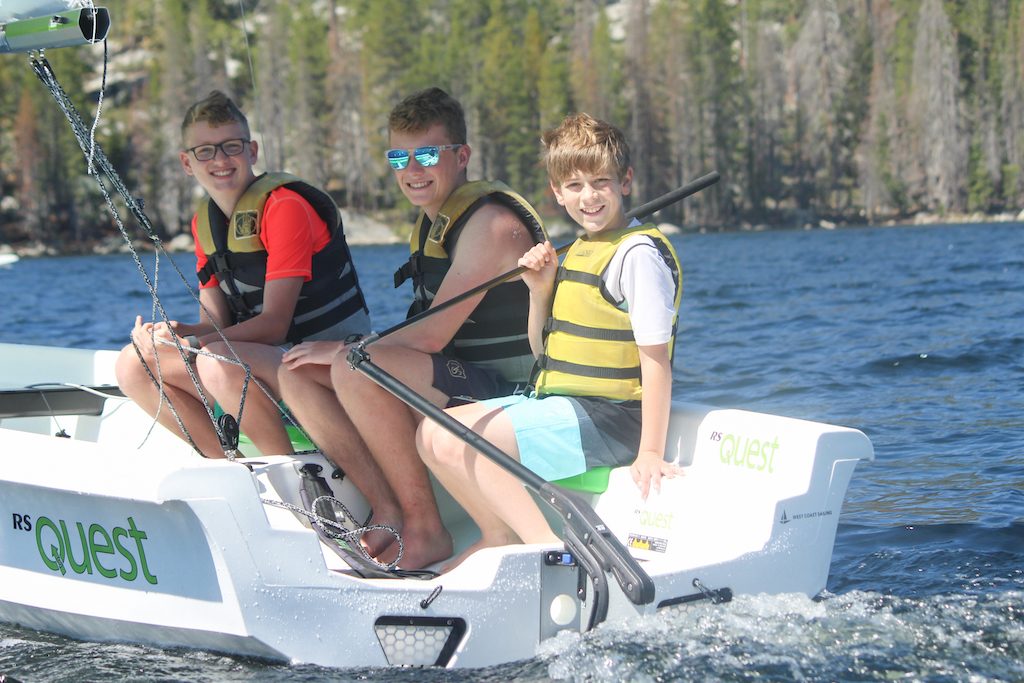
Here are four ways summer camp can help with the parenting challenge of too much screen time:
- DETOX:
Just being completely unplugged for a few weeks is a new and refreshing experience for kids—a true digital detox. Because they’re having fun and staying engaged and entertained, they get over their screen addiction quickly. And, because it’s a “cold turkey” approach with no ambiguity (everyone’s following the same rules), campers don’t push back against being unplugged like they do at home. - CHANGED PERSPECTIVE:
By experiencing screen-free fun and friendships, many campers express a new desire to spend less time on their devices once they return home. Campers and staff have frequently reported examples of providing leadership in asking friends to participate in phone-free times. - APPRECIATION FOR NATURE AND OUTDOOR RECREATION:
While counting shooting stars, appreciating spectacular views from a hike, or smelling the smoke from their campfire, campers aren’t thinking about their TV, video games, and cell phones. Instead, they are experiencing nature and being truly present with others. Many discover new outdoor activities they enjoy, and they are inspired to spend more time outside and in the moment once they return home. - BETTER FACE-TO-FACE FRIENDSHIP SKILLS:
Social interactions can be difficult, and many kids choose to keep interactions safely behind a screen. At camp, while sharing stories around the campfire and spending quality face-to-face time with new and old friends, campers gain more confidence in their social skills and are more likely to pursue real, face-to-face friendships upon returning home.
Getting kids off their screens — and convincing kids how good it feels to be unplugged — can be a real challenge. Summer camp can help.
Be You! Self Reflection for 2020
We’ve really enjoyed sharing our 2020 Summer Theme with you: Be You! As this year comes to a close and we embark on a new year in just a few weeks, take some time to reflect on the weekly Be You challenge questions below.
Hopefully, you jotted down some notes throughout the series, or perhaps you finally have time to dig into these now. Either way, this is a great exercise to finish out the year and get started on narrowing down your One Word for 2021.
-
- Week 1: You’re One of a Kind! – What do you like best about yourself?
- Week 2: Find Your “Flow” – What activities get you into “flow?”
- Week 3: What Stresses you Out? What Calms you Down? – Ask yourself those questions.
- Week 4: Appreciate, Don’t Compare – What do you appreciate about others?
- Week 5: Build Others Up – What can you do to build up a friend?
- Week 6: Positive Self Talk – What are some positive things you say to yourself?
- Week 7: Celebrate What Makes you Different – What makes you stand out from the crowd?
- Week 8: Get Stronger – What is a tiny habit you can create for yourself?
- Week 9: Change the World – How will you bring positive changes to the world?
- Week 10: Be your Best Self – What are you doing to be the best, most authentic version of you?
- What’s the ONE WORD you want to guide your year for 2021?
As we all know, 2020 has been quite a year of challenges, cancellations, and distanced everything. Through it all, being your truly authentic self can set you up to bring positive changes to the world, help you find the silver linings, and be your best self.
Bonus!
Our 2020 and 2021 campers will receive a downloadable Be You journal this month! Keep an eye out for the journal and printable inspirational posters in parent and camper email inboxes.
Five (More) Reasons Great Parents Send Their Kids To Camp
There are so many reasons great parents choose to send their kids to summer camp. Several years ago, I shared five of them on the most popular post I’ve ever published. But now I have more to share. Consider this the second installment in a series with others to follow, because the list of ways kids benefit from summer camp is seemingly endless.
Since I last wrote about reasons great parents send their kids to camp, I conducted research and found that camp experiences positively impact campers’ happiness and social skills. I’ll begin, then, with happiness.
The first reason great parents send their kids to camp is that it helps them BE HAPPIER.
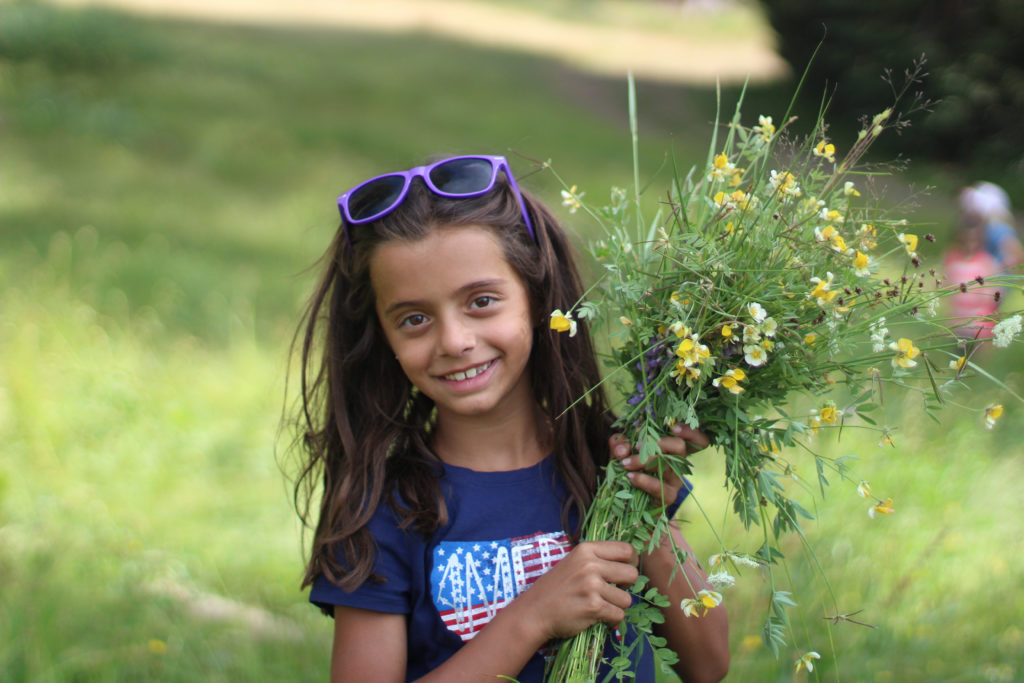
“Camp makes me happy and nothing can prepare me for life as well as this environment.”
“Come on,” you’re thinking, “How can two weeks in the mountains change my child’s overall happiness level?” Good question. One of my research findings was that both parents and kids agree that children feel happier after being at camp. The combination of positive emotions, deep friendships, being disconnected from technology, and just plain fun makes kids feel happier at and after camp I’ve previously written about how the science of positive psychology may explain why kids flourish at camp and demonstrate increased happiness levels before and after their camp experience. In this era, when we’re seeing our kids suffer from rising rates of depression and anxiety, isn’t it nice to know that there’s a place where kids can go that actually serves as a positive intervention for overall happiness?
Next, great parents send their kids to camp because it helps them DISCOVER THEIR BEST SELF.
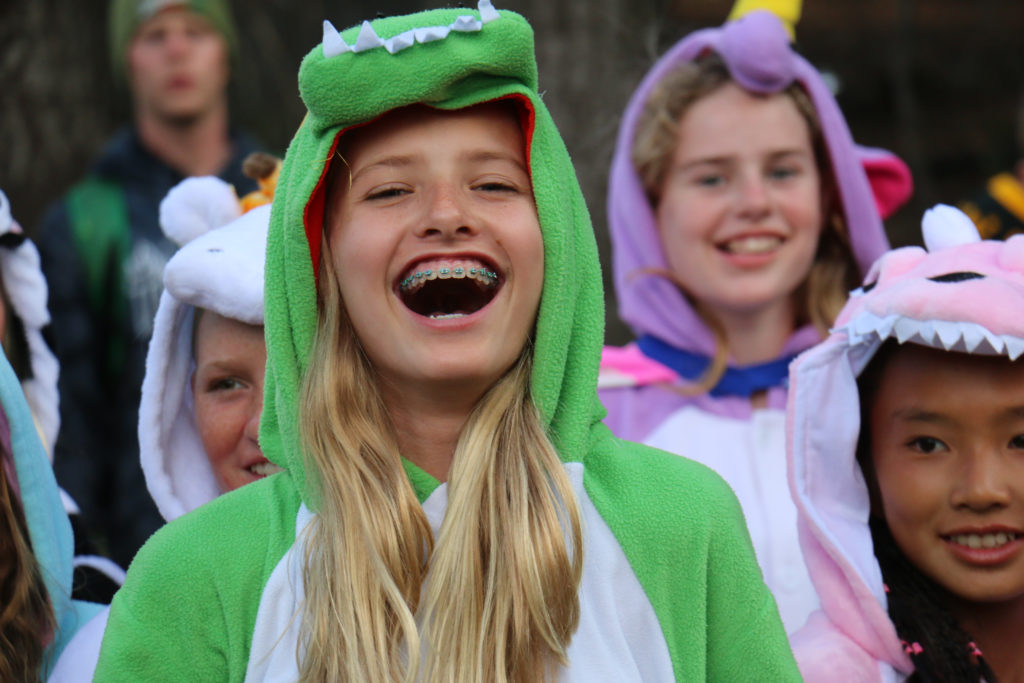
“Being at camp gives me this sense of belonging that I’ve never felt anywhere else.”
In many different ways, but all with the same underlying meaning, campers describe camp as a place where they can be themselves. They feel open to saying and being who they really are, not stuck conforming to what’s considered “cool” and “acceptable” in the outside world. Surrounded by a diverse group of friends of different ages and backgrounds, kids develop the ability to explore their own interests and express their own thoughts better. As a parent, I hate to admit that I sometimes push my own interests on my kids, even when I don’t mean to. For example, I might say, “You’re so good at softball! Don’t you want to keep playing?” when my child says she doesn’t want to play anymore. Stepping away from their regular activities and normal life schedules (as well as their well-meaning but often overly directive parents), kids have the opportunity to think through what’s really important to them as individuals.
Third, great parents send their kids to camp because it helps them GROW THEIR GRIT.
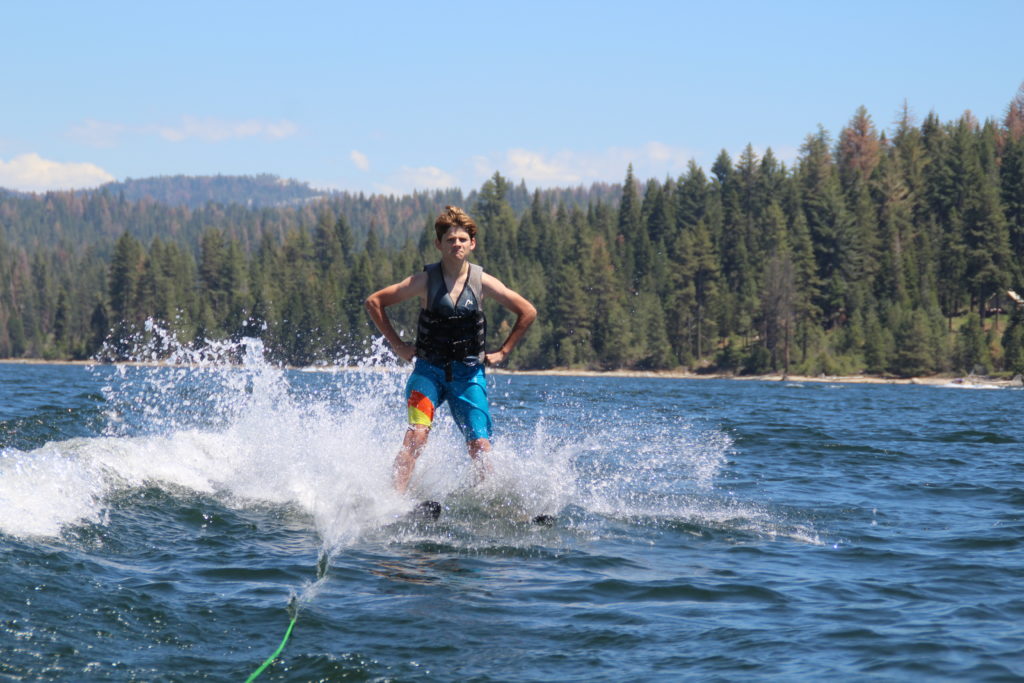
“The counselors challenged me to do things I wouldn’t normally do at home.”
Learning self-reliance, experiencing mistakes and failures, and reaching for goals are all camp experiences that help campers develop their grit, an important character trait that we’ve learned is critical to success in life. Camp offers a unique experience to children – the chance to be away from their parents for a short period of time and learn to handle more things on their own. Without parents to step in and assist, or rescue from mistakes, kids develop confidence in their own ability to make decisions and solve problems. Just being “on their own” is a huge confidence builder for kids, and they feel more self-reliant after being responsible for themselves and their belongings for a few weeks.
Fourth, great parents send their kids to camp because it helps them MEET POSITIVE ROLE MODELS.
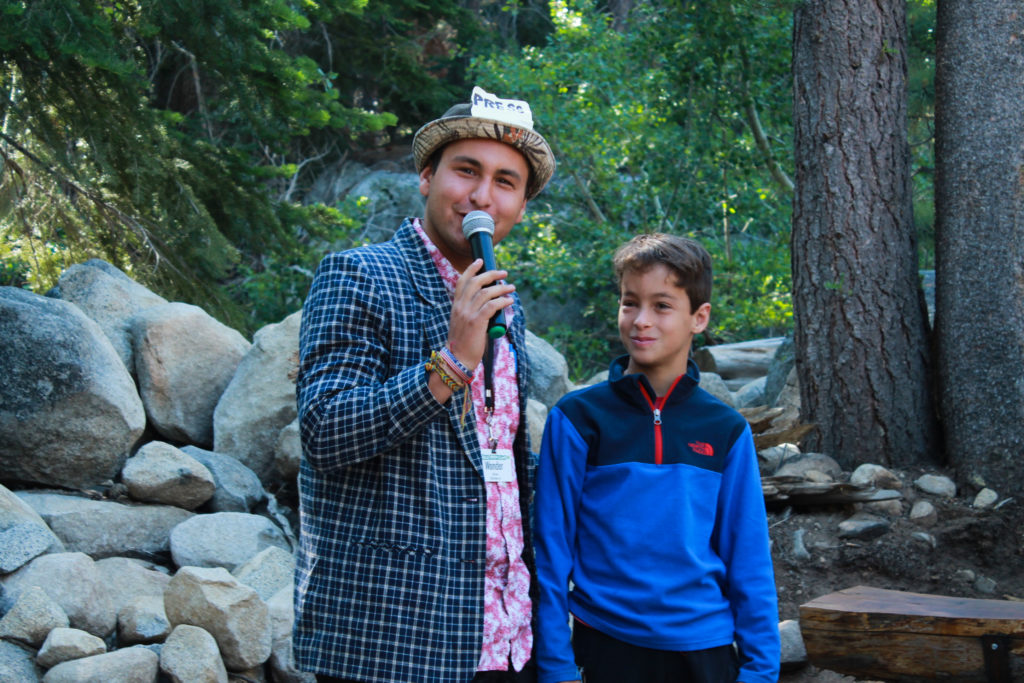
“Camp has made me into a leader, having the best role models as my counselors to look up to.”
One of the best things that happens at camp is that kids get exposed to a different kind of adult role model than what they see in the media. No reality TV stars will be gracing the waterfront or backpacking trips at summer camp. No perfectly coiffed and stick-thin model will be standing next to them brushing teeth in the bathroom. No macho guy who speaks disrespectfully about women will be leading the campfire discussion. In fact, the college students who choose to spend their summer working at camp are an outstanding bunch of young adults. Most are stellar students with outstanding leadership skills. They love the outdoors and working with kids, and they are the kind of people we want our kids to emulate. They love leading discussions on topics that are important to their campers and helping them build confidence. There’s no focus on appearance at summer camp, and so designer clothes, make up, and trendy hair-styles don’t hold the same importance that they do at junior high or high school. In fact, the predominant style at camp is pajama pants paired with dirt and sweat-stained t-shirts. And we hardly ever spend time in front of a mirror.
Finally, great parents send their kids to camp because it helps them DEVELOP BETTER COMMUNICATION SKILLS.
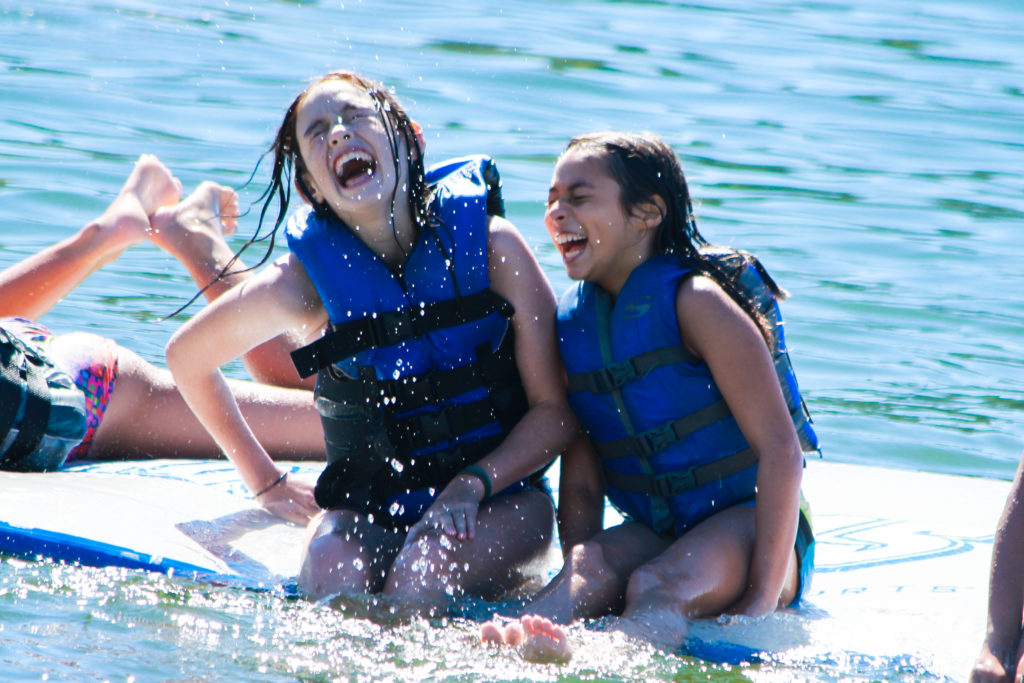
“The other part of camp that has influenced me the most is the simple idea of trying to always smile.”
In post-camp surveys, campers consistently write about how ditching their electronics was one of the best things about their camp experience. In fact, it’s a practice they take home with them, setting aside phones during meals with friends so they can connect more genuinely, face-to-face. In the absence of technological tethers, campers have many hours each day to practice these face-to-face communication skills. They learn the importance of things like eye contact, smiles, and body language as they positively interact with their peers. Counselors help facilitate lively discussions, and campers learn to ask each other questions, listen more carefully, and figure out common interests. Kids learn and practice valuable communication skills at camp, which they can use throughout their lives.
There you have it! Five (more) reasons that great parents send their kids to camp!
This post was originally published on Sunshine’s blog, Sunshine Parenting. For more camp-related posts, visit the “Summer Camp” page at her blog.
Be You: Be your Best Self
BE YOU Week 10: Be your Best Self
“Create the highest, grandest vision possible for your life, because you become what you believe.”
-Oprah Winfrey
For many years we have heard both campers and staff say that camp is where they can be their most true, authentic selves. Being your true self is an important value and we want you to celebrate your differences and what makes you exactly who you are.
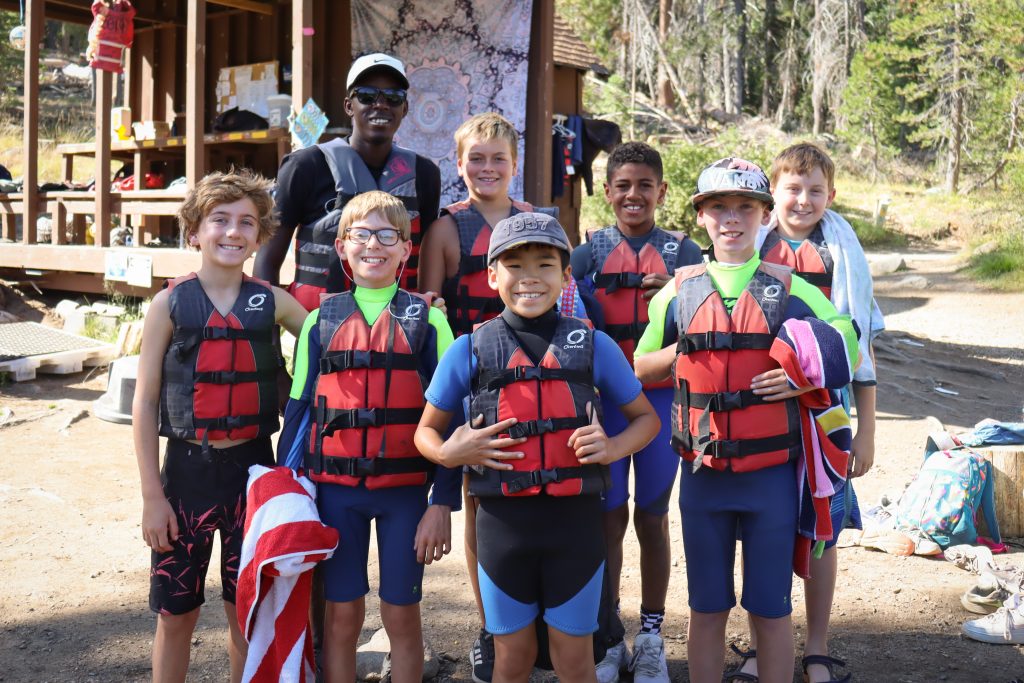
We want to encourage you to continue focusing on being your best self all year long. Depending on where you are in life, the focus might be something different. Let’s take a look back at our deeper questions from each week of our Be You series, to help you find an area that applies to where you are in life right now.
- Week 1: What do you like best about yourself?
- Week 2: What activities get you into “flow?”
- Week 3: What stresses you out? What calms you down?
- Week 4: What do you appreciate about others?
- Week 5: What can you do to build up a friend?
- Week 6: What are some positive things you say to yourself?
- Week 7: What makes you stand out from the crowd?
- Week 8: What is a tiny habit you can create for yourself?
- Week 9: How will you bring positive changes to the world?
- Week 10: What are you doing to be the best, most authentic version of you?
This Week’s #GACbeyou Challenge
Journal or share with someone else (can be a parent, sibling, or friend) your answer to this question:
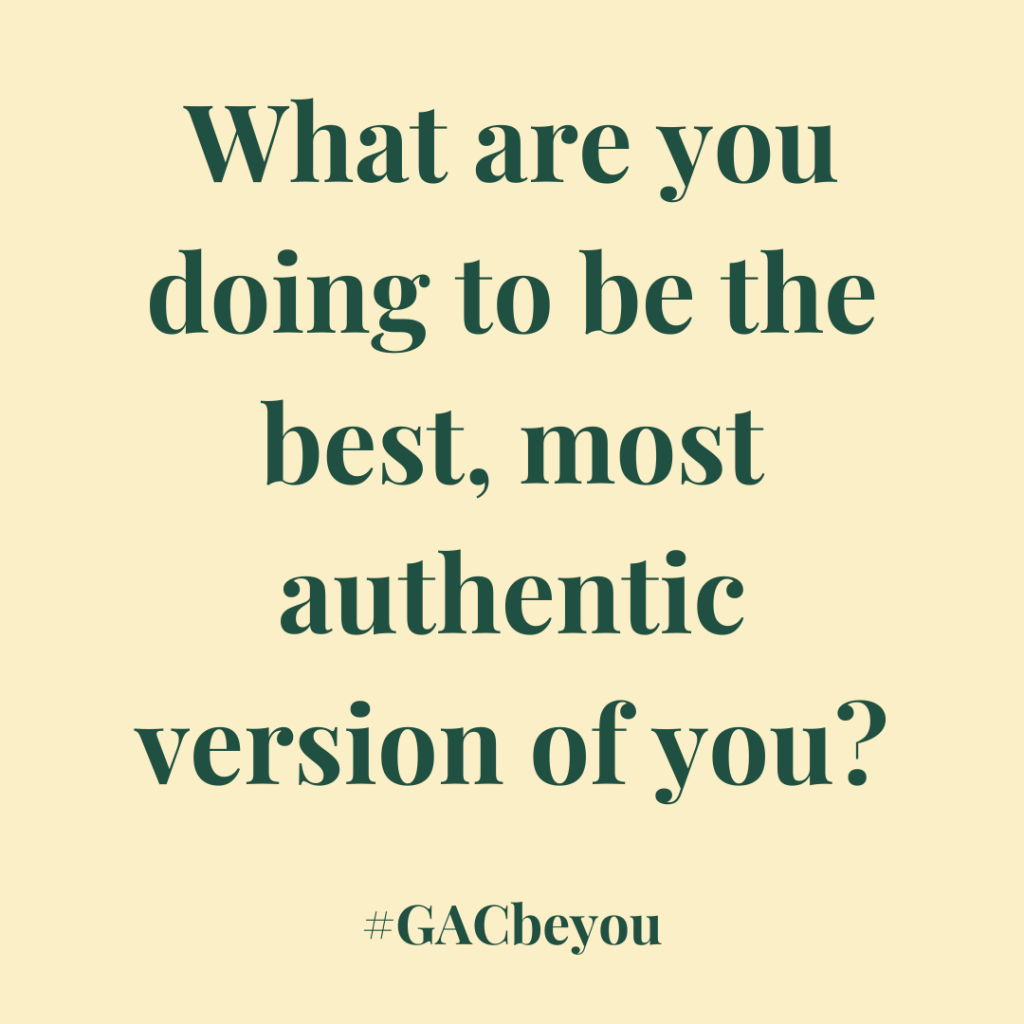
What are you going to do to be the best, most authentic version of you? You can take something we talked about over the course of this series or you can find another area of your life that you want to focus on. By focusing on being your best self, you are going to be giving the world and those around you something special. Everyone and everything will benefit from who you are and what you have to share.
GACspiration
Want to be inspired? Print out this week’s GACspiration and post it on your bathroom door or mirror (just like at GAC)!
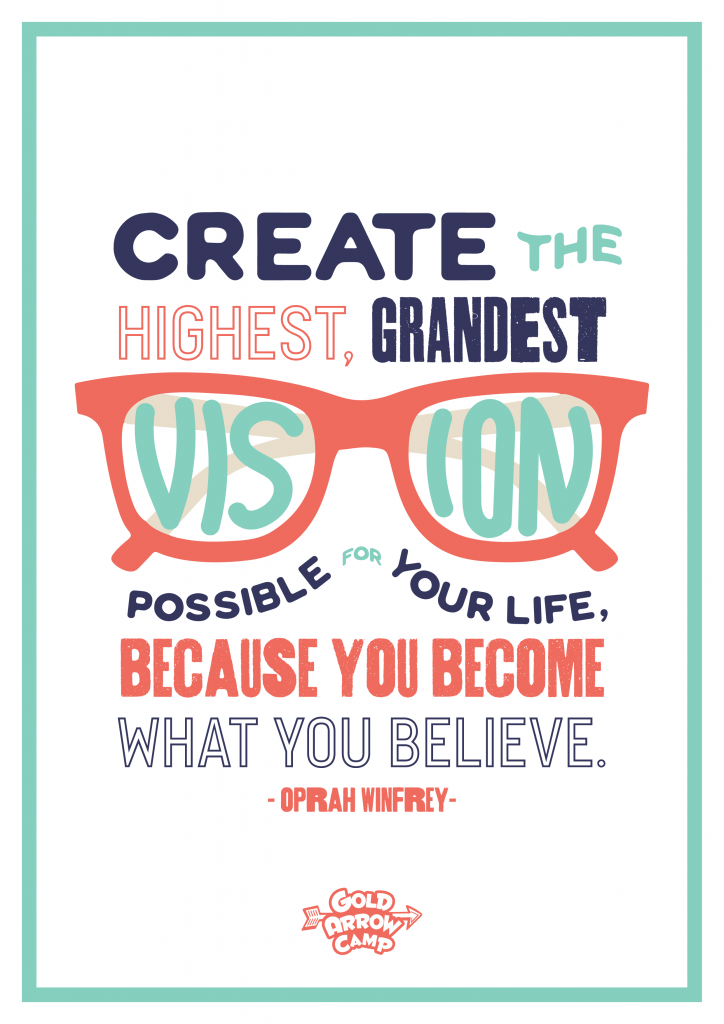
Activity Ideas
Assign a family member, friend, and yourself to each day of the week to be the focus of that day. For example, your mom could be assigned to Monday, assign yourself to Tuesday, your best friend can be Wednesday, your sister on Thursday, etc. Whoever is the focus of the day, make sure you are doing something to help them see the best version of themselves. By bringing out their best qualities, you are, in turn, bringing out yours!
We are so glad that you have joined us on this journey of discovering how to truly be you!
Resources
Podcast: Play in new window | Download
Subscribe: Spotify | Email | RSS
BE YOU: Change the World
BE YOU Week 9: Change the World
“This world needs somebody like you.”
– Anthem Lights
At GAC, we believe in bringing positive changes to the world. In fact, it’s one of our core values that our campers and staff leave GAC ready to be leaders by bringing positive changes to the world.
There is a lot going on in the world today. We can choose to complain about what we don’t like about the world (what many adults do) OR we can take a small action ourselves to help bring a positive change.
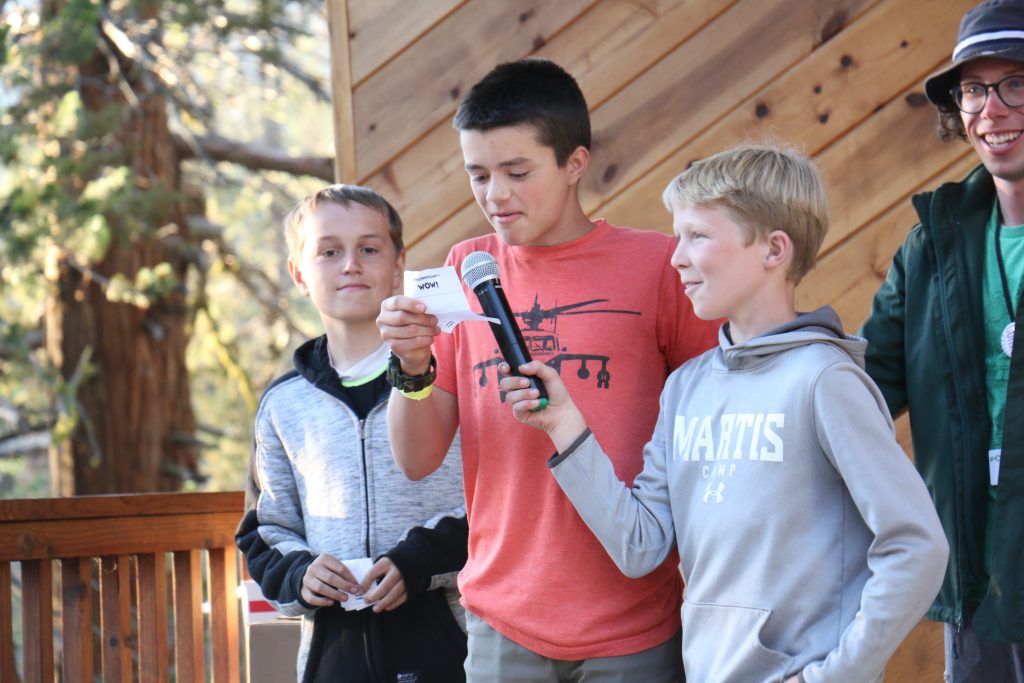
What bothers you most about the world? What’s something you’d like to change or help fix? Instead of complaining about it, do some research about how YOU can contribute your time or skills to make a positive impact.
Change starts with one person believing in something and being willing to take action.
Adults need to stop asking kids, “What do you want to be when you grow up?” or “Where do you want to go to college?” Instead, let’s start asking, “How will YOU bring positive changes to the world?”
This Week’s #GACbeyou Challenge
Journal or share with someone else (can be a parent, sibling, or friend) your answer to this question:
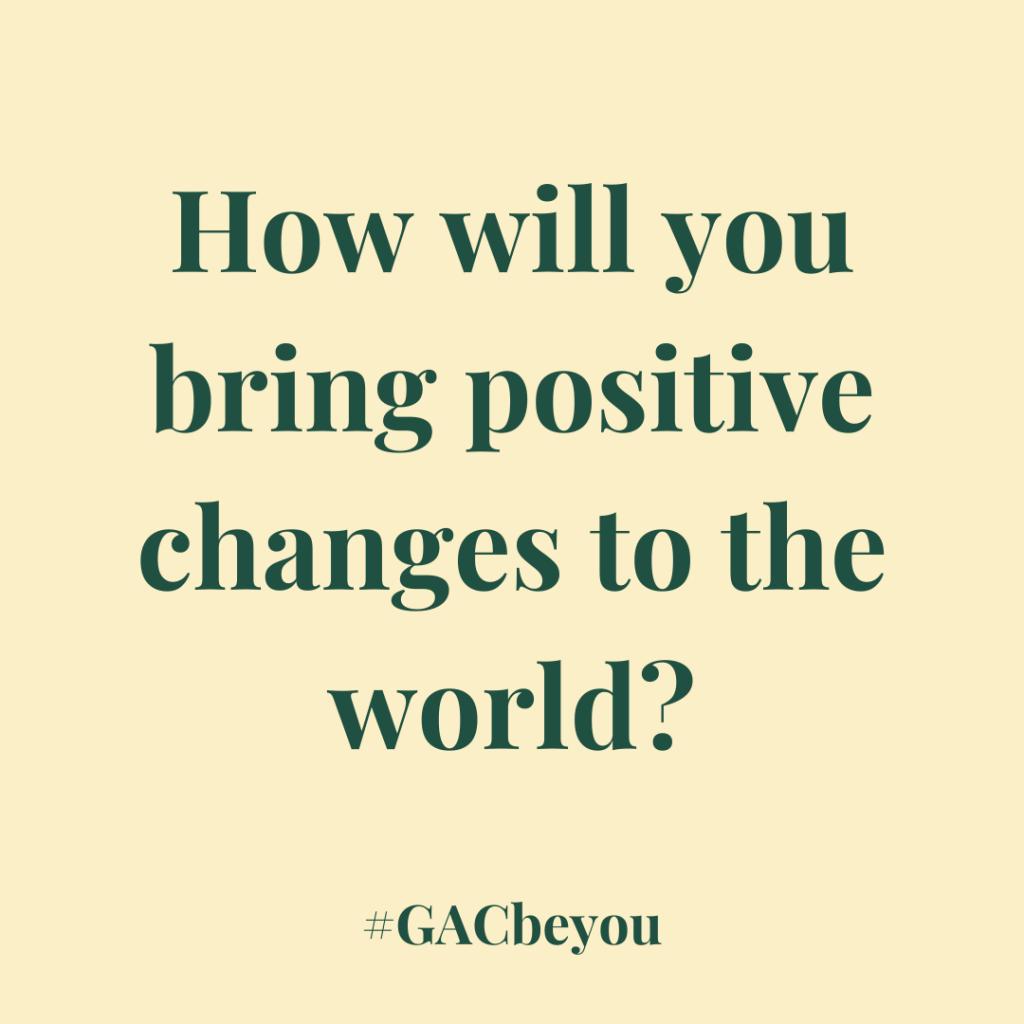
How will you use your unique combination of strengths, skills, and interests to make this world a better place?
Examples of bringing positive change:
- Volunteering to tutor younger kids/ help them learn to read
- Cleaning up trash off of a beach or trail
- Recycling items instead of adding more to landfills
- Educating people about something that’s important to you
- Talking with your family and friends, submitting an op-ed article to your local newspaper, etc.
- Creating art of any kind that brings people happiness
- Music, funny videos, memes, paintings, quote graphics, etc.
Make a list of ways you will bring positive changes to the world and reflect back on them from time to time!
GACspiration
Want to be inspired? Print out this week’s GACspiration and post it on your bathroom door or mirror (just like at GAC)!
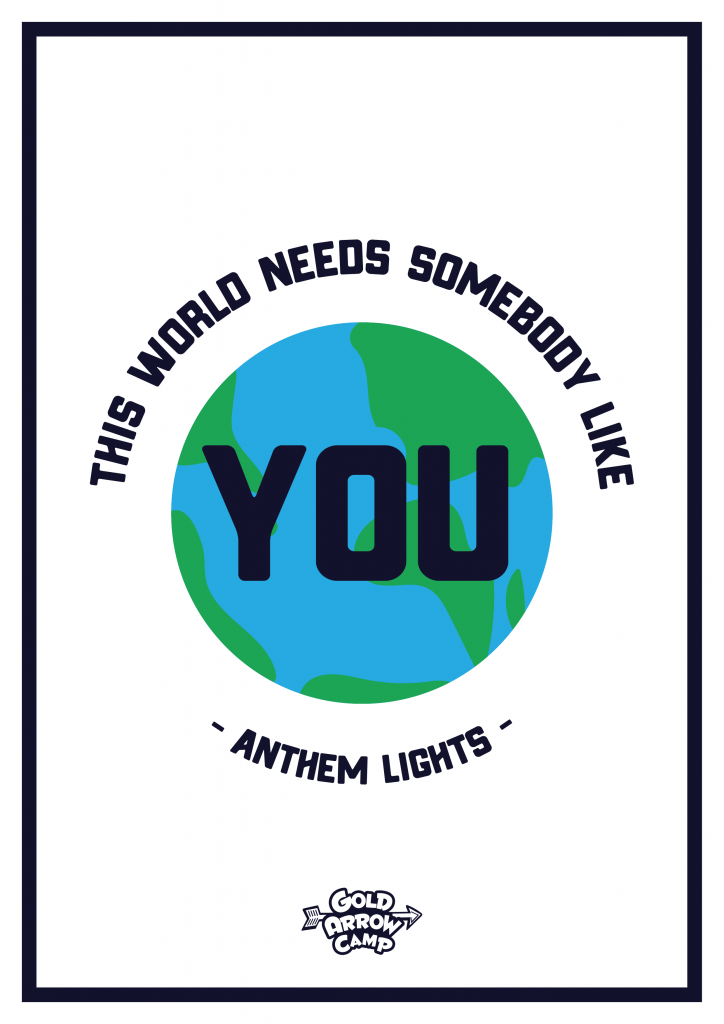
Activity Ideas
Create a world-changing calendar for yourself! At GAC, we have monthly kindness calendars and we want to encourage you to create monthly calendars with ways to bring positive changes to the world. Think of daily or weekly tasks where you can do something nice for a neighbor, your community, or a friend. Create the calendar and print it for easy viewing!
Resources
7 Ways You Can Change the World
Podcast: Play in new window | Download
Subscribe: Spotify | Email | RSS
BE YOU: Get Stronger
BE YOU Week 8: Get Stronger
“The only impossible journey is the one you never begin.”
– Tony Robbins
There are many ways to get stronger. We get stronger physically by exercising or playing sports, but we can also get stronger mentally or emotionally by pushing ourselves outside of our comfort zones. Sometimes we need to test the waters and see how our bodies and minds react to trying something new. We might start to climb the ladder at high ropes and realize that our heart is racing and our body is tensing. That’s okay. You tried and now you can create a goal to try again. Maybe next time you will push yourself to finish climbing the ladder. Then the next time you will push yourself to climb the ladder and stand at the top for ten minutes. While we are pushing ourselves physically, we are also pushing ourselves mentally. We are becoming mentally stronger knowing that we can trust our body and mind to accomplish great things.
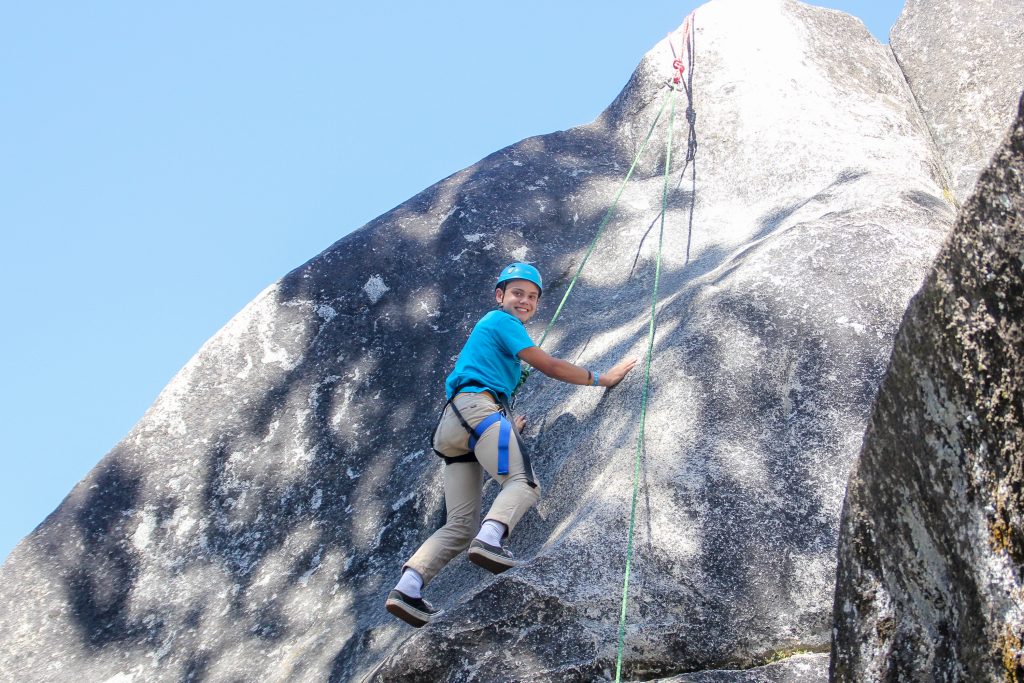
At camp, we like to set goals. Whether you are a camper or a staff member, setting goals is important to the growth you experience during your time at camp. The goals you set for yourself help you push yourself outside of your comfort zone, and in turn, make you stronger emotionally, and maybe even physically. Sometimes our goal is to try a new physical activity, like high ropes or waterskiing, and sometimes it is to emotionally challenge ourselves, like learn three fun facts about a new friend.
This Week’s #GACbeyou Challenge
Journal or share with someone else (can be a parent, sibling, or friend) your answer to this question:
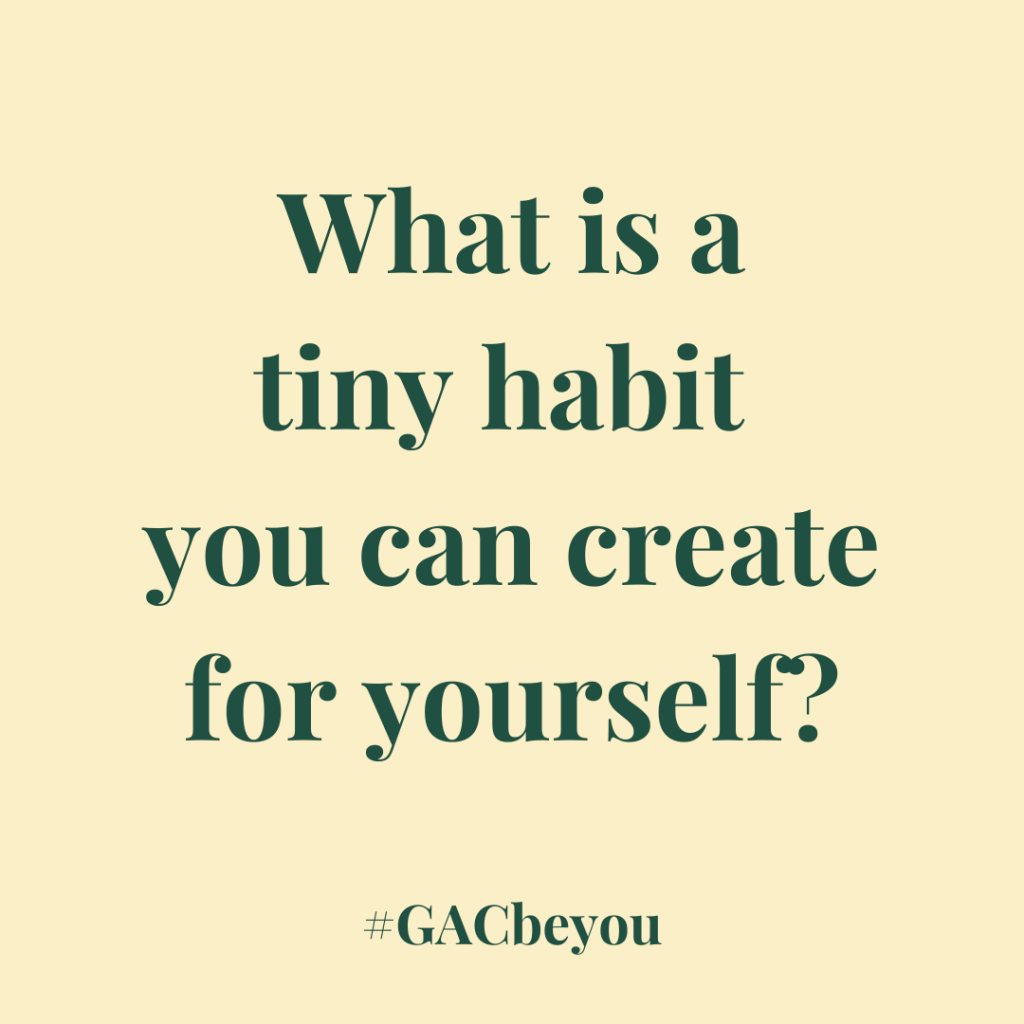
Small things that we commit to doing every day can make us stronger. We get in the habit of doing these things and they become easier and part of who we are. At GAC, we like to use BJ Fogg’s model of Tiny Habits. A tiny habit is something that is so small that if you do it over and over again you will get a changed outcome. Here is a way to create and accomplish your tiny habit:
1. Trigger: After I ______ (pick something you do regularly, like brushing your teeth or picking up your phone)
2. Tiny Habit: I will ______ (do three pushups, write a gratitude note, drink a glass of water, etc.)
3. Celebrate: AWESOME! (pick a celebratory act, like high-fiving yourself in the mirror or giving yourself a fist bump)
When you celebrate your changed behavior, your brain reacts in a positive way and wants that praise more, therefore you will want to keep doing that habit. Once your tiny habit has become easy or part of your everyday routine, you can adjust that habit to keep pushing yourself further.
GACspiration
Want to be inspired? Print out this week’s GACspiration and post it on your bathroom door or mirror (just like at GAC)!
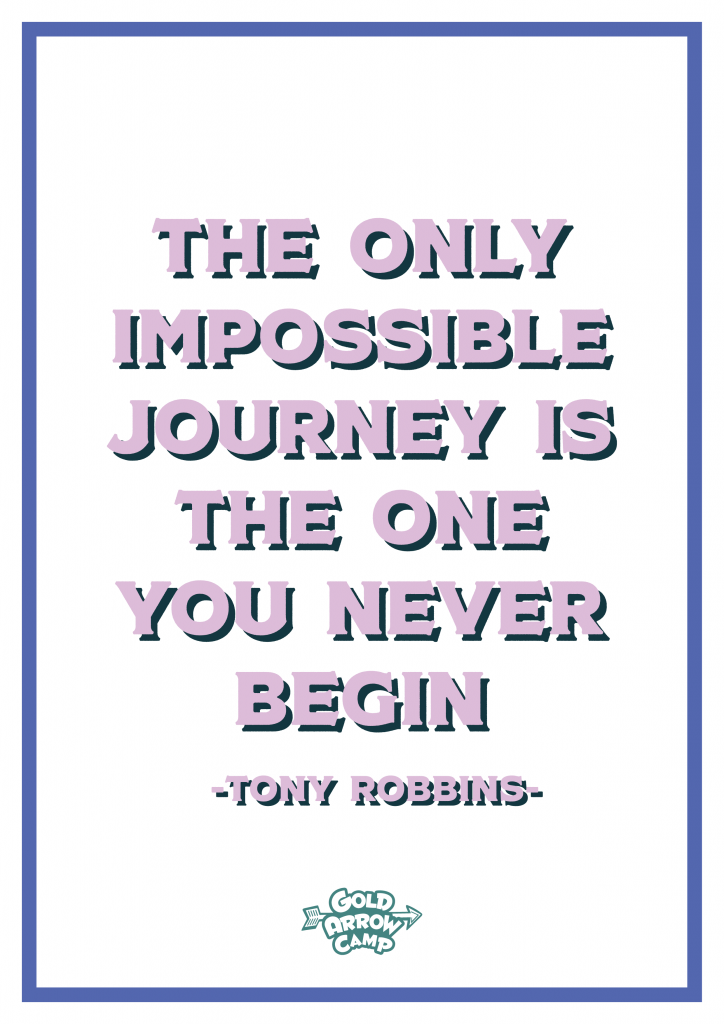
Activity Ideas
Think of ways that you can get physically and mentally stronger that are outside of your comfort zone. What are some physical things that you can do to become stronger? Try to make a tiny habit out of one of those and push yourself to where you are more comfortable doing that activity. Now think of ways you can become mentally or emotionally stronger. Sometimes those physical and emotional actions will overlap. Over time, you will become stronger and more confident!
Resources
Podcast: Play in new window | Download
Subscribe: Spotify | Email | RSS
BE YOU: Celebrate What Makes you Different
BE YOU Week 7: Celebrate What Makes you Different
“Why fit in when you were born to stand out?”
– Dr. Seuss
One of the most important things you can do in your life is to be yourself by being different. Your differences and quirks are the coolest things about you. Let’s embrace our differences to truly be our best selves!
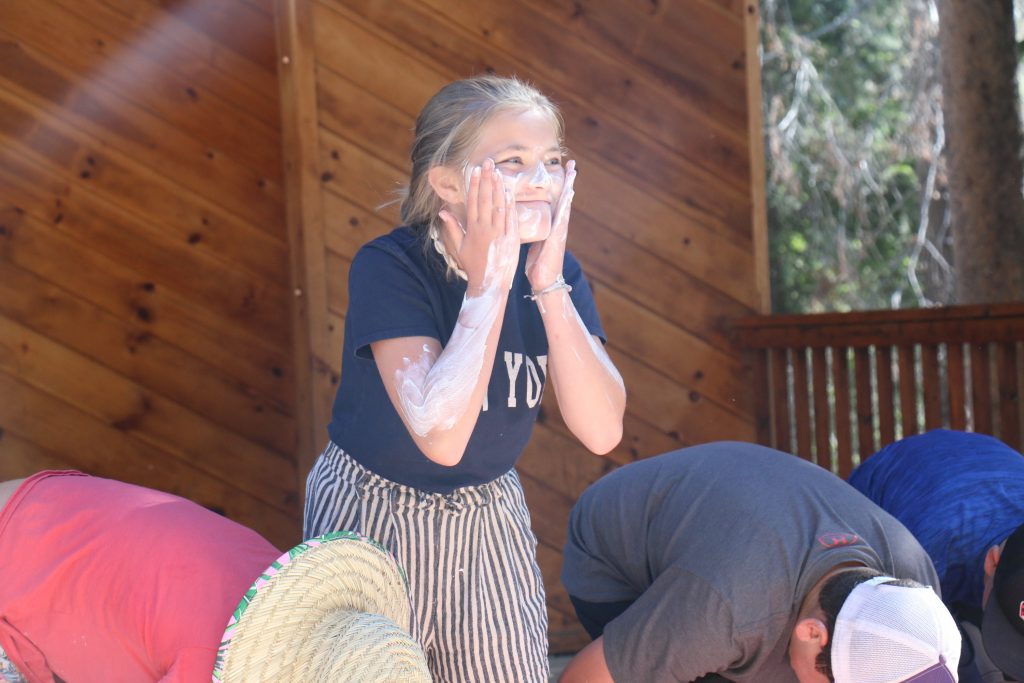
Camp is one of the best places to completely be yourself. You are encouraged to dance silly, play crazy games, and embrace others’ quirks. When we all come together at camp, everyone’s differences in a cabin group are what make the experience so special. We all bring something unique to the table through our personalities, interests, and talents. We need to be recognizing those unique character traits and celebrating them!
Sometimes it’s easier to think that an interest or your personality is not “normal,” but really what does that even mean? We throw around the word “normal” about certain things, but who ultimately decides what is normal and not? Instead of thinking about things as not normal or different, just think of them as the unique set of traits that sets you apart from everyone else. Doesn’t that sound cool? You are different and that’s the best part about you because that means you are truly being who you are!
This Week’s #GACbeyou Challenge
Journal or share with someone else (can be a parent, sibling, or friend) your answer to this question:

This week, think about things that make you happy and that you love doing, but others may view as “interesting” or “weird.” Those are the things that make you stand out and that your friends appreciate about you. If we were all the same, how boring would life be? The things that make us different are the very things that make us stand out from the crowd and make us unique. Embrace the things that make you YOU. Celebrate your differences and keep being you!
GACspiration
Want to be inspired? Print out this week’s GACspiration and post it on your bathroom door or mirror (just like at GAC)!
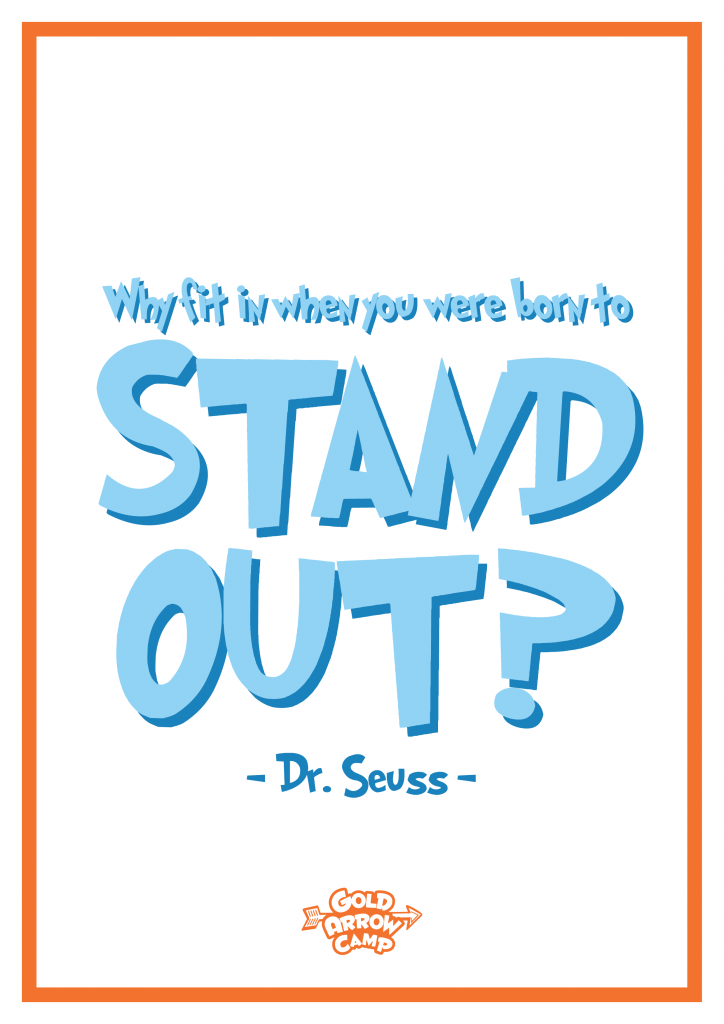
Activity Ideas
A fun activity to get you thinking about things that make you stand out from the crowd is creating an acrostic with your name! To create an acrostic, write out your name with one letter being on each line of a piece of paper. Next to each letter, write out a character trait or something you enjoy doing that sets you apart from others that starts with that same letter. Here is an example for Henry (the dog):
Hairy
Energetic
Nurturing
Regal
Young at heart
Have fun creating your acrostic! Feel free to share them on social media and tag us using #GACbeyou!
Resources
The Artisan Life’s Positive Adjectives
Podcast: Play in new window | Download
Subscribe: Spotify | Email | RSS
Happy Campers at Home: 4 Ways to Boost Family Relationships
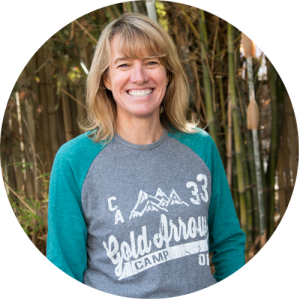 Audrey “Sunshine” Monke, GAC’s Chief Visionary Officer, researches, writes, and speaks about parenting, social skills, and strategies for raising thriving kids at Sunshine Parenting. In her book, Happy Campers: 9 Summer Camp Secrets for Raising Kids Who Become Thriving Adults, Sunshine shares simple ideas parents can use to create the fun, connection, growth, and happiness of GAC at home. Here are four of Sunshine’s favorite connection tips for families.
Audrey “Sunshine” Monke, GAC’s Chief Visionary Officer, researches, writes, and speaks about parenting, social skills, and strategies for raising thriving kids at Sunshine Parenting. In her book, Happy Campers: 9 Summer Camp Secrets for Raising Kids Who Become Thriving Adults, Sunshine shares simple ideas parents can use to create the fun, connection, growth, and happiness of GAC at home. Here are four of Sunshine’s favorite connection tips for families.
If you were to ask me the most important thing parents can provide their children, camp counselors can provide campers, and teachers can provide students, I can sum it up with one word: Connection.
-Audrey “Sunshine” Monke
Building a relationship and connecting with kids—while also helping them learn to connect with each other and form friendships—is the most important experience we can provide our kids to inoculate them against the inevitable setbacks they will face in life.
Here are some simple ideas from GAC for boosting family connections.
One-on-One Check Ins
On our counselor job description, one of their duties is to “check in with each camper, every day.” We call these check-in meetings “One-on-Ones.” Counselors ask campers specific, open-ended questions to elicit how campers are feeling. The counselors ask about their friendships, activities, how much they’re missing home, what’s going well, and if they need help with anything.
These are individual conversations, out of earshot of other kids, that last anywhere from two to five minutes. The campers get accustomed to the check-ins, so they’re not surprised when their counselor starts chatting with them.
As a simple way to deepen your connection with your kids, and know how you can best support them, try having at least one daily one-on-one chat with each of them, modeled after what camp counselors do:
Turn off or put away your phone (and have them put theirs away, too).
Stop doing everything else (cooking, looking at a magazine, etc.).
Give your child your full attention (eye contact, body turned toward them, not thinking about other things).
Ask them a few open-ended questions. “Tell me about the best part of your day” is an easy place to start.
Your one-on-one chats can be anytime. You can make it a daily ritual over an after-school snack, while sharing a hot drink, or while tucking them in at bedtime, but that small, concerted daily investment of time will lead to a closer connection between you and your kids.
If your kids are already teens, know that the best way to have one-on-one chats is to be open to whenever they initiate the talk with you rather than forcing them to be on your schedule. When they talk, drop everything else you’re doing, focus on them, and listen!
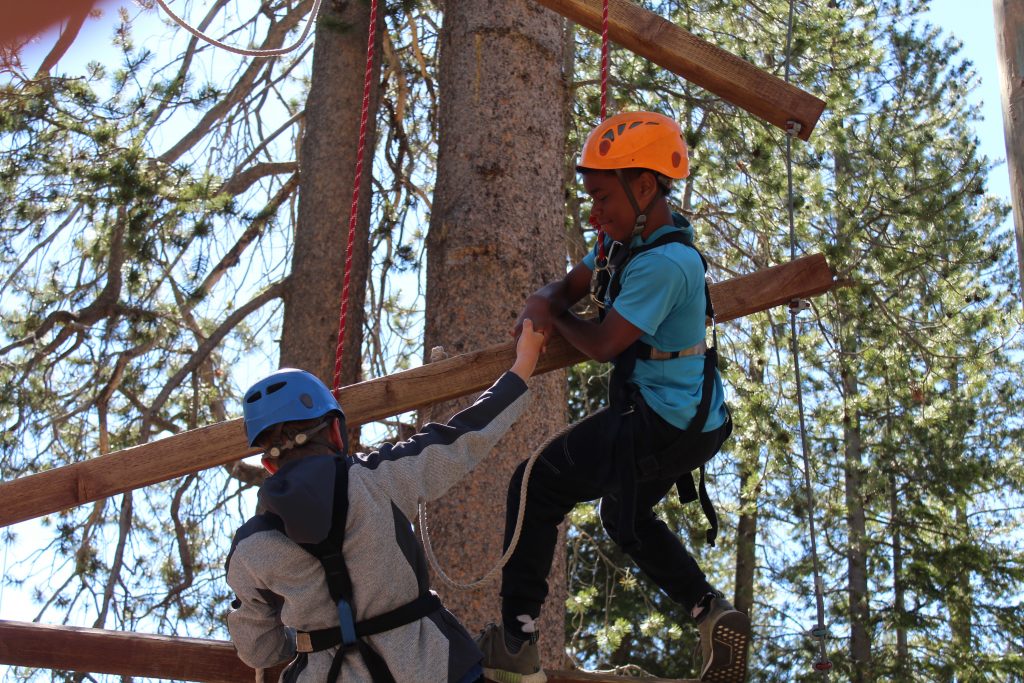
Daily Sharing
A highlight of each day at camp is our evening campfire. Gathered around the fire, counselors lead a daily sharing practice. Campers remember these conversations fondly and the evening campfires are many campers’ and staff members’ favorite camp memories.
Find a time each day – dinner or bedtime are often good times to set up a consistent sharing practice – to spend just a few minutes sharing with each other.
The only rules for your daily sharing are that one person speaks at a time and everyone else listens to the person speaking. Your kids may need a few reminders, as listening attentively is a skill most of us need to work on!
Your kids (especially if they are preteens or teenagers) may balk when you bring up the idea of daily sharing and do it for the first time. Stay strong. They will eventually learn to appreciate your daily sharing practice. Even if they continue balking, don’t stop. Even if they don’t show it on the outside, they will eventually come to appreciate a time each day when caring people listen to what they have to say.
Here are a few daily sharing ideas:
“Highs & Lows” or “Roses & Thorns”
This is a simple and well-known sharing practice where each family member shares something good that happened in their day (a high) and something bad (a low). Sharing often leads to stories and discussion about different events — the side track conversations are good, so let those happen! There are also additions you can add. At camp, we often do High, Low, and Hero, where each camper shares their high and low as well as someone who was kind to them or a “hero” that day. Another twist on this activity is called “Rose, Thorn and Leaf.” The rose is the high, the thorn is the low, and the leaf is something you’re looking forward to.
Three Good Things
Each person shares three good things that happened in their day or three things they are grateful for. This gratitude exercise (when journaled) has been proven to reduce depression symptoms. While your sharing conversation won’t be written down (unless you choose to do so), it can still bring a positive focus to your sharing. Ideally, because everyone anticipates the daily sharing, everyone will be more aware of and looking out for the positive things that happen every day.
Kindness
Sunshine loves the idea of sharing something each person did that was kind or something kind someone else did for you. Focusing on kindness is incredibly important in our increasingly unkind-seeming world.
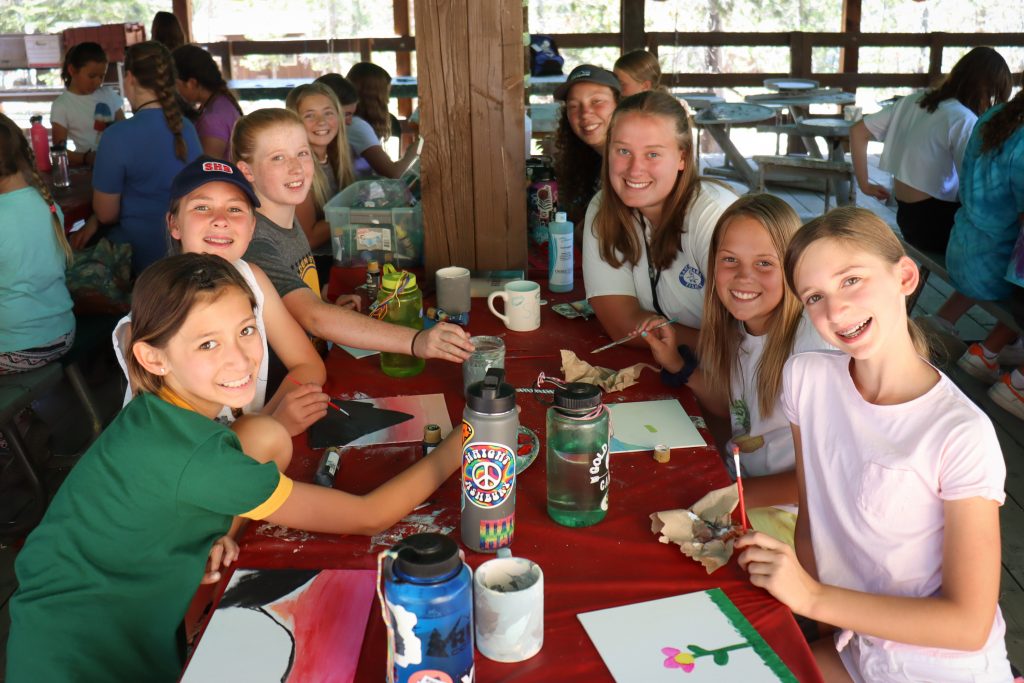
Ask Questions
Questions are a great way to connect with each other and get conversations started.
Here are a few to get you started (from the Questions for Connection GAC counselors use):
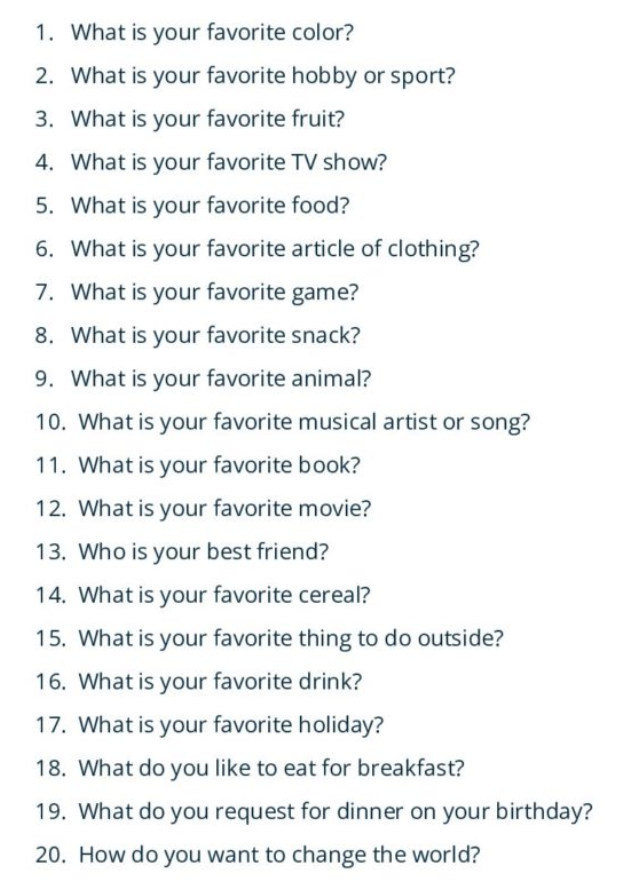
Sticky Note Compliment
At GAC, we focus on campers’ strengths and encourage them to think about building upon their strengths. Often as parents we spend a lot of time managing our children or helping them with things they are not good at. A great way to connect and make your child feel great is to leave an encouraging note on your child’s bathroom mirror, on their pillow, or in their lunch box. Tell your child something you really appreciate about them and something that’s an inner quality or strength.
Download Family Connection Tips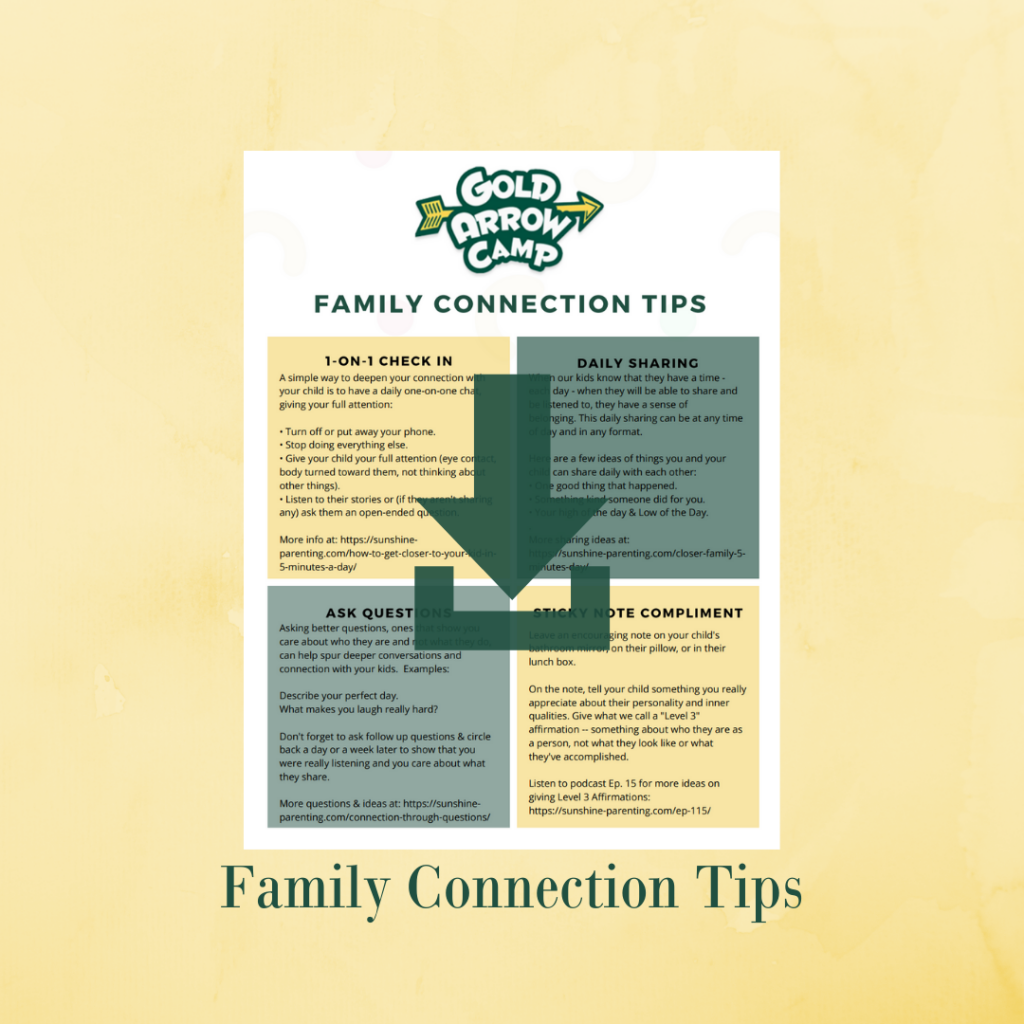
Resources/Related Posts
BE YOU: Positive Self Talk
BE YOU Week 6: Positive Self Talk
“The more I like me, the less I want to pretend to be other people.”
– Jamie Lee Curtis
The self-talk you do in your own head can help or hurt you. If you are talking negatively to yourself, it will hurt your confidence and your self-love. If you are talking yourself up and speaking positive things, you will in turn help yourself be more confident, and will hopefully love yourself all the more!
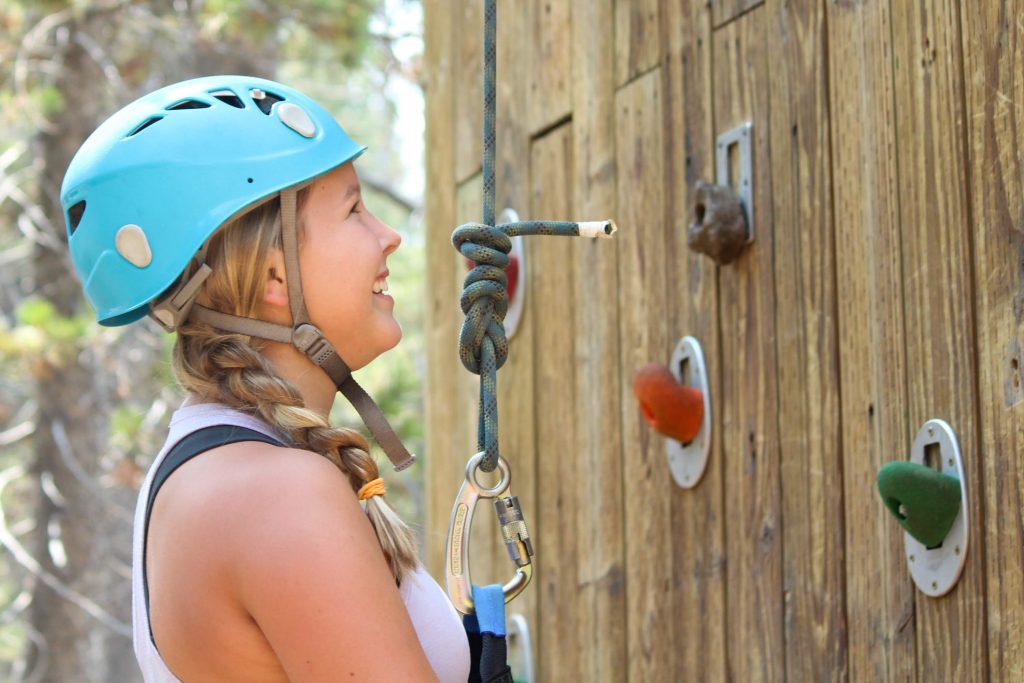
The way we think changes how we feel and our behaviors. To be more confident, you have to change the way you think about yourself. Sometimes we say mean things to ourselves when we should be speaking to ourselves the same way we would speak to a friend. Before saying something to yourself, think, “Would I say this out loud to a friend?” If not, erase it and move on. If so, say it and celebrate!
We know ourselves better than anyone else. We know our strengths and our weaknesses, and we know the areas we need to improve upon versus the areas where we are stronger. It’s often easier for us to notice the more “negative” areas in our lives and be more critical with ourselves. Instead of focusing on those negatives, let’s try to solely focus on the positive parts of our lives. Tell yourself you are proud when you accomplish something you have strived to complete. Tell yourself you are a good friend when you help someone in need. Tell yourself you can do it when you are facing something difficult. When you talk to yourself in a positive light, you will likely spread happiness and positivity to others. When you think of yourself with positive thoughts, you will be more confident in your own skin. Nothing looks better than confidence!
This Week’s #GACbeyou Challenge
Journal or share with someone else (can be a parent, sibling, or friend) your answer to this question:
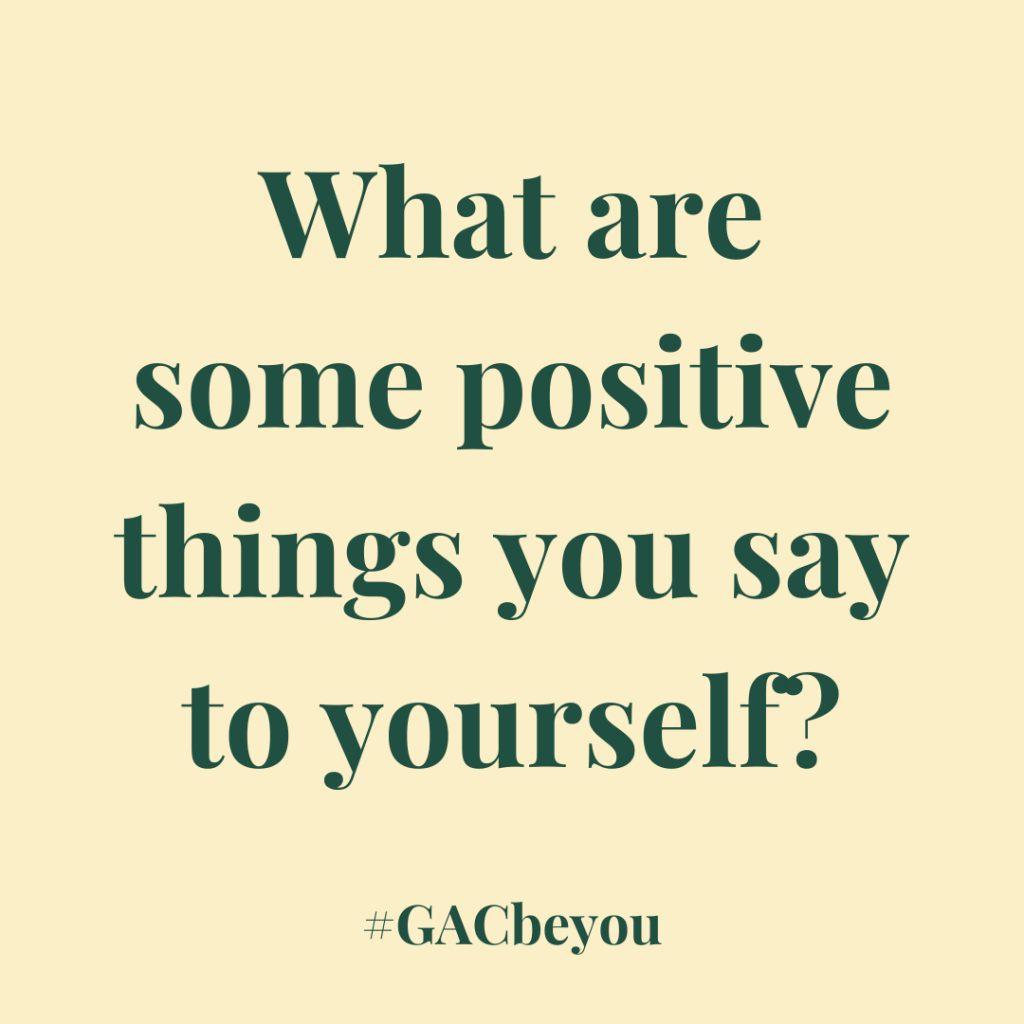
What are some positive things you regularly say to yourself? Write these things down and keep them handy. When you need a reminder of how awesome you are, look back at your list. Looking back at the nice things you have said about yourself will remind you of all of the positive attributes that you have noticed in yourself. Since we sometimes tend to focus on the negatives instead of the positives in ourselves, choosing to notice all of the great qualities about you will help you focus on those positive things.
GACspiration
Want to be inspired? Print out this week’s GACspiration and post it on your bathroom door or mirror (just like at GAC)!
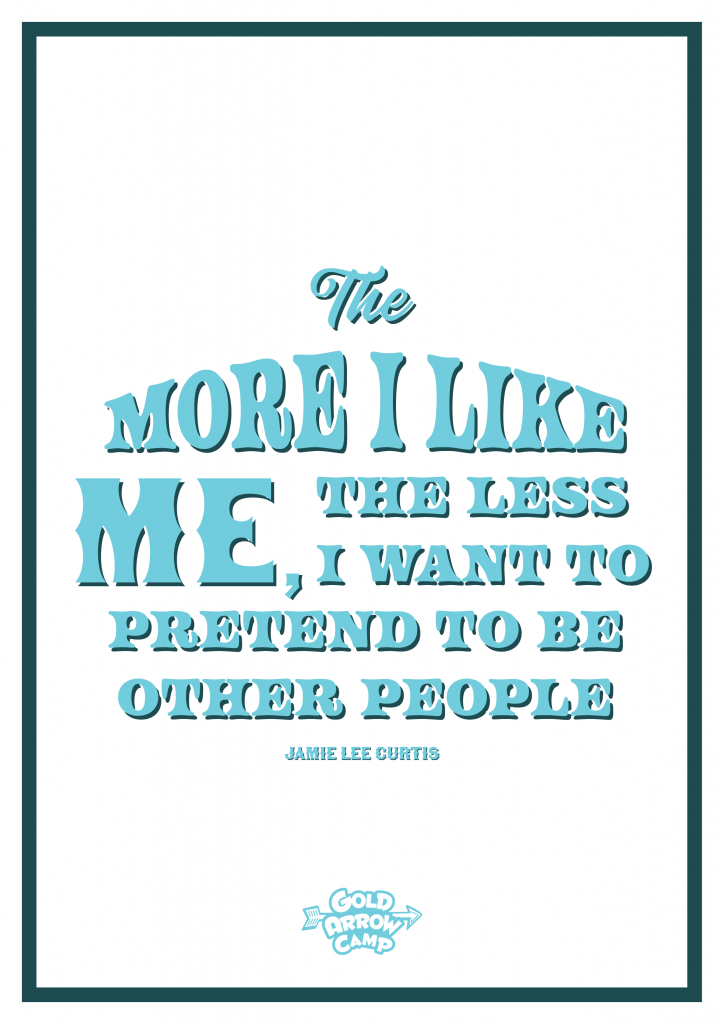
Activity Ideas
Develop a mantra. A mantra is a word or phrase that is repeated to help aid concentration in meditation. Come up with some pep talks for yourself for when you need a boost or a reminder of how awesome you are! Make some mantras for different situations that you may encounter. Write them down or memorize them and say them when needed. You can do it!
Resources
Podcast: Play in new window | Download
Subscribe: Spotify | Email | RSS
BE YOU: Build Others Up
BE YOU Week 5: Build Others Up
“Be somebody who makes everybody feel like a somebody.”
– Kid President
One way we can be our best selves is by bringing out the best traits in others. When we’re at our best, we feel confident in ourselves and don’t feel the need to put others down.
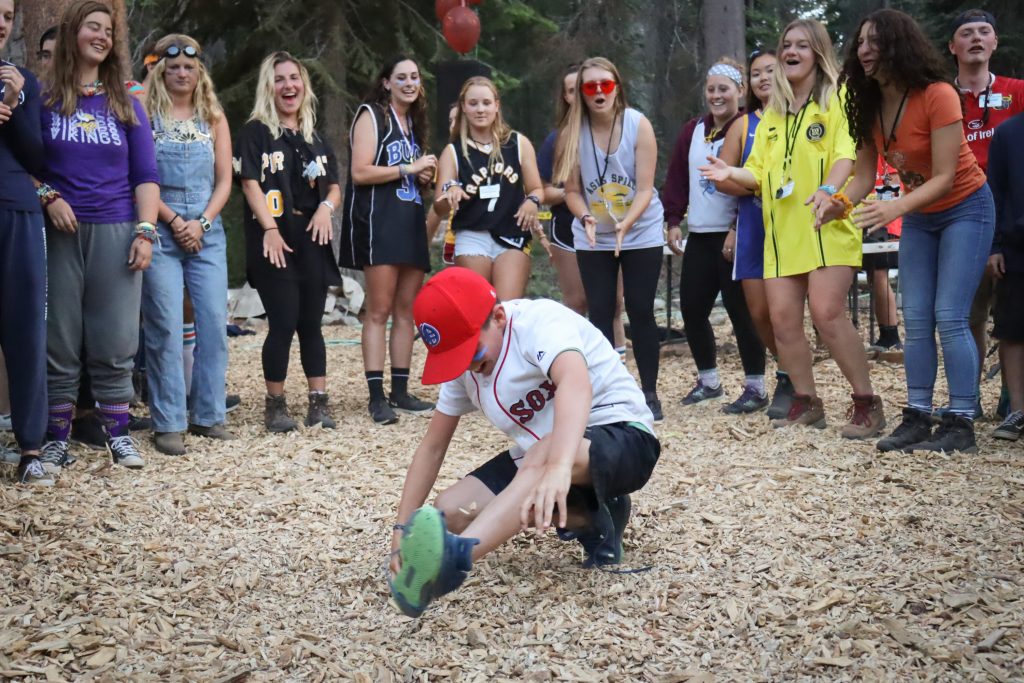
Building others up is a great way to boost the feelings of others while doing something nice for yourself. There are many ways to build others up. Think about things that make you feel more confident or happy, and pay it forward by treating or doing a similar thing for someone else. Here are a few ways you can build others up:
- Introduce them to someone else.
- We all love making new friends. If you have friends that do not already know each other, introduce them!
- Ask questions.
- When you ask questions to get to know someone, it shows that you have a genuine interest in that person’s life. Having someone show interest in your life make’s you feel pretty important!
- Give Compliments or Put-Ups.
- Share genuine compliments regarding their actions or personality.
- Lend a Helping Hand.
- Helping someone is a kind act that allows others to feel worthy of your time and attention.
- Encourage. Encourage. Encourage.
- Share your encouragement and positive thinking with others while they work their way towards a goal.
- Celebrate Accomplishments.
- Nothing feels better than your accomplishments being celebrated by friends! Return that feeling to someone who has accomplished something they have been working hard at or trying to complete.
This Week’s #GACbeyou Challenge
Journal or share with someone else (can be a parent, sibling, or friend) your answer to this question:
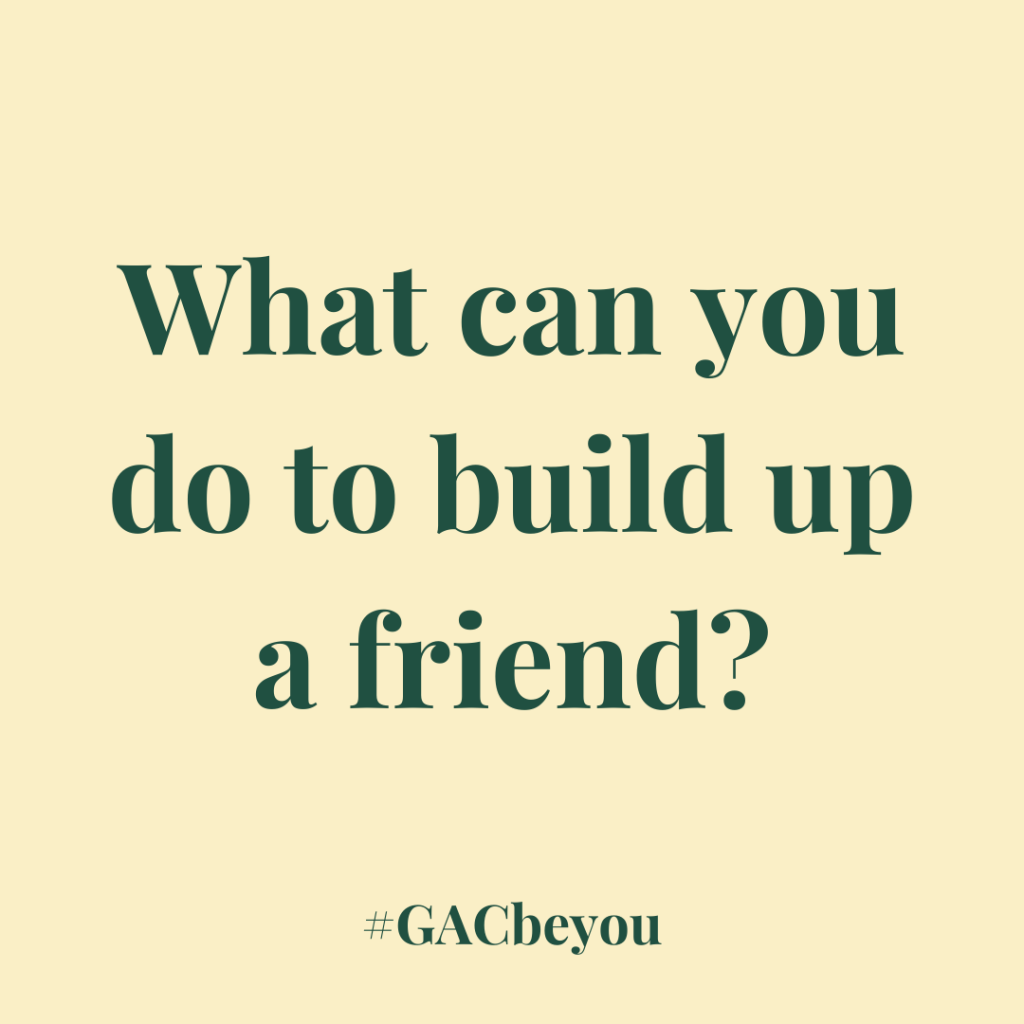
Your challenge this week is to find a way to build another person up and help them be their best self. So think about someone in your life – a family member or friend – and give them a sincere compliment, tell them something positive you notice about them, and look for ways to make them feel loved and accepted.
Ask your friends about things they’re interested in. Find out what makes them feel good and try to remember what they like or what they’re good at. You will help them feel good about themselves, and in turn, you will feel good about yourself.
GACspiration
Want to be inspired? Print out this week’s GACspiration and post it on your bathroom door or mirror (just like at GAC)!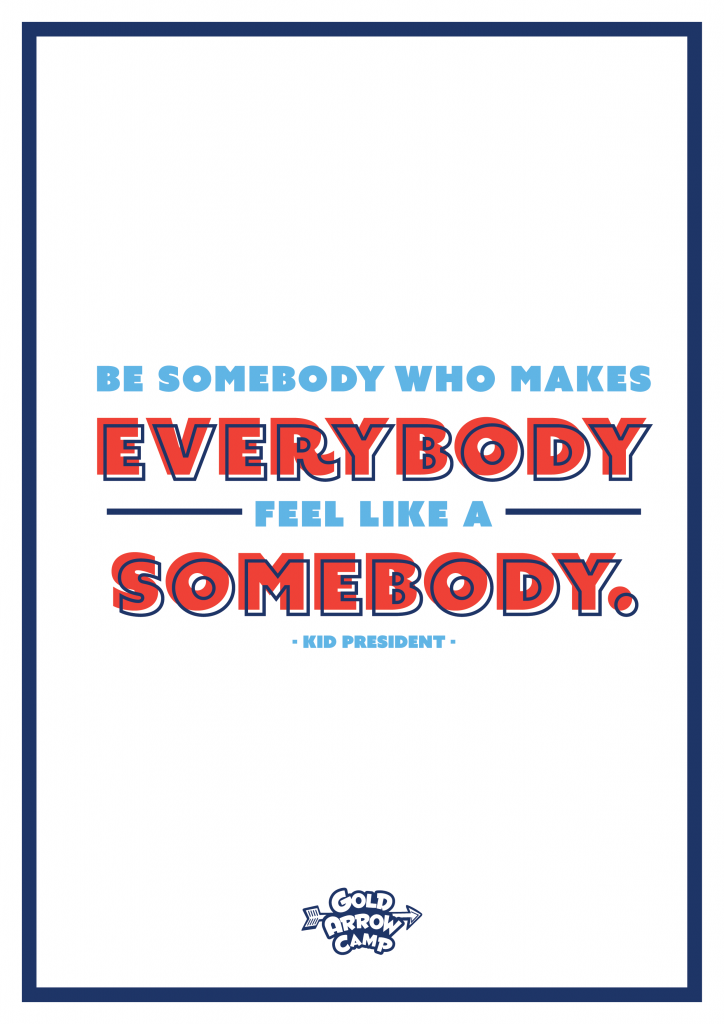
Activity Ideas
This week, we challenge you to build yourself and others up! Find different ways to build your friends up. While building others up, you will feel better about yourself. Keep a list of ways for future reference so that when you need a way to help or encourage a friend, you will be able to look back at it for ideas.
Resources
In Helping Others, You Help Yourself
Podcast: Play in new window | Download
